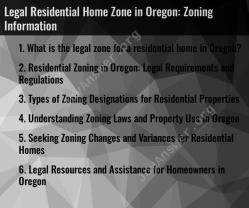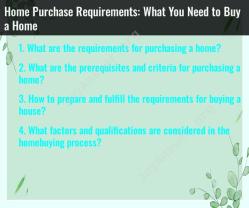How to be a successful first-time home buyer?
Being a successful first-time homebuyer involves careful planning, financial responsibility, and thorough research. Here are some tips and guidance to help you navigate the home-buying process successfully:
Determine Your Budget:
- Assess your financial situation, including your income, expenses, and savings. Use online calculators to estimate how much you can afford. Consider factors like down payment, monthly mortgage payments, property taxes, insurance, and maintenance costs.
Improve Your Credit Score:
- A good credit score can help you qualify for a lower interest rate on your mortgage. Pay down existing debts, pay bills on time, and check your credit report for errors. Consider getting pre-approved for a mortgage to understand your financing options.
Save for a Down Payment and Closing Costs:
- Aim to save at least 20% of the home's purchase price for a down payment to avoid private mortgage insurance (PMI). Additionally, budget for closing costs, which typically amount to 2-5% of the home's price.
Research and Understand the Market:
- Research the real estate market in your desired area. Understand local property values, market trends, and the neighborhoods you're interested in. This research will help you make informed decisions.
Work with a Realtor:
- A real estate agent can help you navigate the home-buying process, find suitable properties, and negotiate on your behalf. Choose an experienced agent who knows the local market.
Get a Home Inspection:
- Once you find a home you're interested in, have it professionally inspected. This will help you identify any hidden issues that may affect the property's value or safety.
Understand the Mortgage Options:
- Explore different types of mortgages, such as fixed-rate and adjustable-rate mortgages. Compare interest rates, terms, and lenders to find the best mortgage for your needs. Be prepared to provide financial documents for the mortgage application.
Budget for Ongoing Costs:
- Beyond the down payment and closing costs, consider the ongoing expenses associated with homeownership, including property taxes, insurance, utilities, maintenance, and repairs.
Negotiate Wisely:
- Work with your real estate agent to negotiate the best deal. Be prepared to make a competitive offer, but don't overextend your budget.
Have an Emergency Fund:
- It's essential to have an emergency fund for unexpected home repairs or financial setbacks. This fund will provide a financial safety net and prevent you from going into debt.
Attend Homebuyer Education Programs:
- Many areas offer homebuyer education programs and workshops that can help you better understand the home-buying process and financial responsibilities.
Read and Understand All Documents:
- Carefully review all contracts and documents, including the purchase agreement, disclosure statements, and the mortgage contract. If you don't understand something, ask for clarification.
Be Patient and Do Your Due Diligence:
- Don't rush the process. Take your time to find the right home that fits your budget and meets your needs. Be thorough in your research and inspections.
Plan for the Future:
- Consider your long-term plans. Will this home meet your needs for the foreseeable future, or do you anticipate changes such as starting a family or changing jobs?
Seek Professional Advice:
- Consult with a financial advisor or attorney if you have specific questions or concerns about your purchase.
Being a successful first-time homebuyer is about making informed decisions, sticking to your budget, and being prepared for the responsibilities of homeownership. It's a significant financial commitment, so take your time and ensure you're making the right choices for your situation.
1. How to be a successful first-time home buyer
To be a successful first-time home buyer, it is important to be prepared and informed. Here are some tips:
- Get pre-approved for a mortgage. This will give you an idea of how much you can afford to borrow and help you make a more competitive offer on a home.
- Do your research. Learn about the different types of mortgages available, the home buying process, and the local real estate market.
- Work with a qualified real estate agent. A good agent can help you find the right home for your needs and budget, and guide you through the buying process.
- Be prepared to negotiate. It is common to negotiate the price of a home, especially in a competitive market.
- Be patient. Finding the right home and getting approved for a mortgage can take time. Don't get discouraged if you don't find the perfect home right away.
2. Steps to follow when purchasing your first home
Here are the steps to follow when purchasing your first home:
- Get pre-approved for a mortgage.
- Start your home search. Work with a real estate agent to find homes that meet your needs and budget.
- Make an offer on a home. Once you find a home you love, you will need to make an offer. Your real estate agent can help you with this process.
- Negotiate the offer. The seller may counter your offer, and you may need to negotiate back and forth.
- Get the home inspected. Once your offer is accepted, you will need to have the home inspected by a qualified inspector. This will help you identify any potential problems with the home.
- Close on the home. Once the inspection is complete and any necessary repairs have been made, you will be able to close on the home and officially become a homeowner.
3. Tips for finding the right property as a first-time home buyer
Here are some tips for finding the right property as a first-time home buyer:
- Consider your needs and budget. What is important to you in a home? How much money can you afford to spend?
- Be flexible. You may not be able to afford everything you want in a home, so be prepared to compromise.
- Look at different neighborhoods. Consider the factors that are important to you, such as schools, crime rates, and proximity to work and amenities.
- Don't be afraid to negotiate. Once you find a home you like, don't be afraid to negotiate the price.
4. Financial considerations for first-time home buyers
Here are some financial considerations for first-time home buyers:
- Down payment. Most lenders require a down payment of at least 3% of the purchase price of the home. However, a larger down payment will reduce your monthly mortgage payment and save you money on interest over the life of the loan.
- Closing costs. Closing costs are fees associated with buying a home, such as appraisal fees, title insurance, and loan origination fees. Closing costs typically range from 2% to 5% of the purchase price of the home.
- Monthly mortgage payments. Your monthly mortgage payment will include your principal, interest, property taxes, and homeowner's insurance.
- Other costs. Homeownership also comes with other costs, such as maintenance, repairs, and utilities.
5. Resources and programs to assist first-time home buyers
There are a number of resources and programs available to assist first-time home buyers. Here are a few examples:
- Federal Housing Administration (FHA) loans: FHA loans allow borrowers to buy a home with a down payment as low as 3.5%.
- Department of Veterans Affairs (VA) loans: VA loans are available to qualified veterans and service members. VA loans do not require a down payment.
- USDA Rural Development loans: USDA Rural Development loans are available to borrowers who want to buy a home in a rural area. USDA Rural Development loans do not require a down payment.
- State and local programs: Many states and local governments offer programs to assist first-time home buyers. These programs can provide financial assistance, down payment assistance, and/or other forms of support.
If you are a first-time home buyer, I encourage you to research the resources and programs that are available to you. This can help you make the home buying process more affordable and less stressful.













